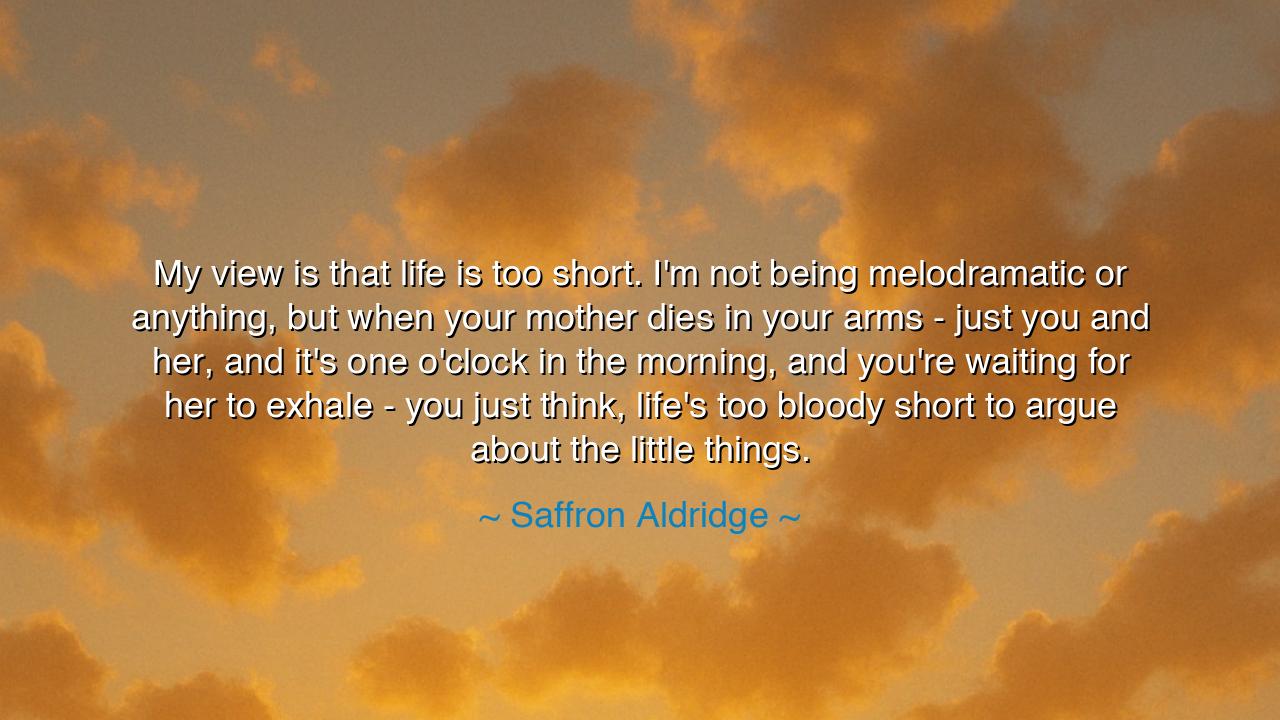
My view is that life is too short. I'm not being melodramatic or
My view is that life is too short. I'm not being melodramatic or anything, but when your mother dies in your arms - just you and her, and it's one o'clock in the morning, and you're waiting for her to exhale - you just think, life's too bloody short to argue about the little things.






"My view is that life is too short. I’m not being melodramatic or anything, but when your mother dies in your arms—just you and her, and it’s one o’clock in the morning, and you’re waiting for her to exhale—you just think, life’s too bloody short to argue about the little things." Thus spoke Saffron Aldridge, not with the idle musings of leisure, but with the searing wisdom of one who has stood face-to-face with mortality. These words, born in the silence of death’s shadow, are not meant for ornament, but as a torch to light the way for those still stumbling through the pettiness of life’s quarrels.
The death of a mother—the one who gave breath, now leaving with her final breath—is among the most profound encounters a human being can endure. Aldridge describes this moment not in poetry, but in plain truth: alone, at one o’clock in the morning, waiting for the last exhalation. In such a moment, time itself collapses. Arguments, vanities, and worldly disputes wither to nothing. Only the stark reality remains: that life is fragile, fleeting, and too short to waste on bitterness.
Her words echo the voices of the ancients who also saw wisdom in mortality. The Stoics, such as Marcus Aurelius, counseled themselves daily: “You could leave life right now. Let that determine what you do and say and think.” He, too, understood that the awareness of death strips away illusion. What is left is the call to live nobly, to cherish what matters, and to cast aside quarrels that do nothing but poison the hours we have. Aldridge’s testimony is but a modern expression of this timeless philosophy.
History reminds us again in the story of Pericles, who, after the plague of Athens, stood before his city and reminded them that grief, though heavy, must teach them to treasure the time left. Thousands had perished, and in the ashes of that tragedy he urged Athenians not to waste their lives in trivial strife, but to live with honor and purpose. In the same way, Aldridge speaks from the intimate plague of personal loss: her mother’s final breath became her own awakening.
The lesson is clear: life is too short to squander on quarrels, grudges, and the small grievances that so easily consume us. Death teaches us this truth, but we need not wait for such searing moments to learn it. Each dawn we rise, we are given a finite number of breaths. To waste them in bitterness is to dishonor the gift of being alive. The wise do not wait until the deathbed of a loved one to learn this—they cultivate the awareness of life’s brevity now, and live accordingly.
Practical action is within reach of all. When anger rises over small matters, recall Aldridge’s night of waiting for her mother’s last breath. Ask yourself: will this quarrel matter when death draws near? When impatience, envy, or pettiness gnaws at you, remember that the clock of life ticks relentlessly, and each moment wasted cannot be reclaimed. Choose instead forgiveness, gratitude, and love, for these are the treasures that endure when all else fades.
Thus Saffron Aldridge, through the raw honesty of grief, gives a gift to those who listen: the wisdom of mortality without the need to face it firsthand. Her words stand as a reminder, stern yet compassionate, that life is too short to be wasted in darkness. If we learn this lesson, if we live with awareness of the brevity of time, then perhaps we will fill our days not with quarrels, but with light, with kindness, and with the courage to love while breath is still in our lungs.






AAdministratorAdministrator
Welcome, honored guests. Please leave a comment, we will respond soon